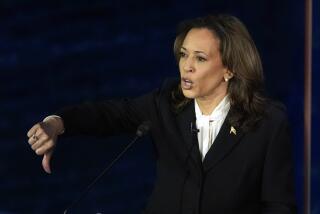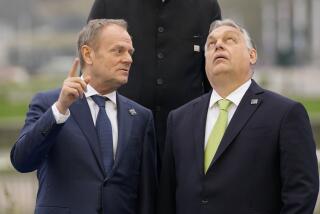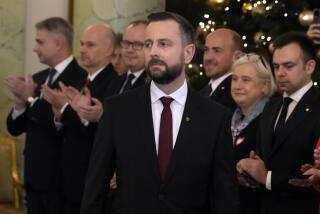Ex-Communist Looks to Be a Shoo-In for 2nd Term as Poles’ President
- Share via
WARSAW — President Aleksander Kwasniewski, speaking to a crowd of supporters plus a few hecklers at a recent campaign rally in this city’s Old Town Square, mixed his typically all-inclusive message with carefully nuanced jabs at his critics.
“Those who are whistling, shouting and throwing leaflets--I would like them to know that if I am reelected president,” he said, “then irrespective of how their actions upset me, how improper and lacking in style they are, I will also try to serve those people as president, as head of state, as the family head in this house of all Poles.”
A former Communist now generally viewed as a supporter of capitalism and democracy, Kwasniewski has built his presidency and his campaign on the idea that he is a president for everyone--someone with gracious manners who can build bridges rather than divide society.
With polls giving him an enormous lead, Kwasniewski, 45, has a solid shot at winning reelection in first-round voting Sunday by capturing an outright majority. If he does, it will mark a humiliating defeat for politicians with roots in the old pro-democracy Solidarity union movement.
Ironically, however, an easy Kwasniewski victory would also mark the consolidation of democracy in Poland, 11 years after the collapse of communism here, because it would mean that a clear majority believes that the former Communists want democracy and can be trusted to preserve it.
“I don’t think Kwasniewski’s political camp and Kwasniewski himself would want to violate the logic and the rules of the democratic system, especially since it has proved so successful for them,” said Edmund Wnuk-Lipinski, a scholar at the Institute of Political Studies in the Polish Academy of Sciences.
Other key figures in the race are former President Lech Walesa, independent liberal Andrzej Olechowski and center-right leader Marian Krzaklewski, who succeeded Walesa as head of Solidarity.
A survey conducted Sunday by the respected PBS polling agency showed Kwasniewski with 52% support, Olechowski at 15%, Krzaklewski at 7% and Walesa at 4%.
If no candidate breaks 50% in the vote, the top two finishers will face off Oct. 22.
Kwasniewski squeaked into office in 1995 after an extremely bitter campaign, winning narrowly over incumbent Walesa, the Nobel Prize-winning former union leader who helped topple communism in Poland. Back then, voters were polarized, with some nostalgic for the job security and social benefits of communism while others were angry about its repression and economic stagnation and fearful that former Communists might somehow roll back the clock.
Kwasniewski’s greatest accomplishment in office has been to put those concerns largely to rest. He was a strong advocate, for example, of Poland’s entry into the North Atlantic Treaty Organization last year.
Now the badly divided Solidarity-based center-right not only has poor prospects for this election but seems likely to lose control of parliament and the prime minister’s office in general elections next year.
While largely successful in pushing through market-oriented reforms that have given Poland strong economic growth in recent years, the former Solidarity activists who achieved this have been hurt politically by a public backlash against the pain involved.
“Conflicts within the government camp when reforms were introduced had a disastrous impact on how the reforms were perceived by society,” Wnuk-Lipinski said. “The popular way of thinking was: ‘If they fight among themselves, then do the reforms make sense? Probably they don’t.’ ”
Kwasniewski was a rising star in the liberal wing of Poland’s Communist Party as it stumbled toward collapse in the late 1980s. He sat on the government side in its negotiations with Solidarity that led to a historic 1989 “round table” agreement ushering in democratic reforms. He quickly remade himself into a supporter of democracy and capitalism, while remaining on the left in terms of social issues and government spending.
Krzaklewski, 50, who engineered the victory of the ruling Solidarity Election Action bloc in 1997 parliamentary elections, initially seemed best positioned to be the leading challenger to Kwasniewski. But his campaign has failed to catch fire despite an effort to present a populist image and ignite anger against the incumbent’s Communist past and lack of any visible religiosity.
Krzaklewski’s most dramatic campaign move was the airing late last month of a television advertisement using old video clips to attack Kwasniewski for seeming to engage in a mockery of Pope John Paul II.
The footage showed Kwasniewski and one of his top aides, Marek Siwiec, on a 1997 visit to the town of Kalisz in central Poland. A smiling Kwasniewski, coming down the steps of his helicopter, can be heard asking Siwiec whether he has kissed the soil.
Siwiec then gets down on his knees, in a characteristic gesture of the Polish-born pope on his travels, and kisses the grass.
The video clip seemed to sharply conflict with the all-inclusive image Kwasniewski has worked so hard to project. Last Sunday’s PBS poll showed Kwasniewski down 9 percentage points from his 61% support just one week earlier, an indication that the incident was hurting him.
Krzaklewski also has attacked Kwasniewski for serving the Communist Party while much of Poland was rising against it.
“Some people joined the ranks of the Communist Party at a time when workers’ blood was spilled in the streets,” Krzaklewski declared at a campaign rally, targeting Kwasniewski without naming him. “At the same time, other people got together and organized themselves for the struggle for an independent Poland.”
Although Walesa nearly won reelection in 1995, losing 52% to 48%, his popularity has sagged since then. He’s still considered a hero of the anti-Communist struggle, but many viewed him as an argumentative and ineffective president. Many Poles also consider him insufficiently polished in social graces and speech to represent the country well, despite his fame and the respect shown him by foreigners.
Walesa has framed his campaign as a crusade, running on the slogan “Black is black. White is white.” That is a reference, he said, to his view that the former Communists are getting away with blaming center-right politicians for economic pain that should really be blamed on the mess left by the Communists when they lost power in 1989.
Walesa, 57, also doesn’t hide the fact that he’s bored by early retirement and wants to be at the center of political action.
“If someone is active and then just returns home, he simply won’t live long,” Walesa said in remarks reported by Gazeta Olsztynska, a regional daily newspaper in northeastern Poland.
“I came back [after leaving the presidency], and after a month my wife asked me to dust furniture and fold sheets. I thought I would go crazy. I got used to something different. Active people simply can’t stop. My wife agrees, because she simply wouldn’t be able to stand being with me.”
Olechowski, 53, who served as finance minister in 1992 and then foreign minister from 1993 to 1995, enjoys relatively broad appeal, projecting competence and avoiding close identification with either the left or the right.
While running second to Kwasniewski in the polls, he lacks an organized political base. He treats that as one of his assets, however, arguing that he doesn’t need to reward political cronies or feel beholden to one party.
At a recent campaign appearance in the Warsaw suburb of Jozefow, Olechowski stressed a philosophy of promoting opportunities rather than handing out social benefits in the form of government spending.
“I say get rid of the barriers to creating news jobs, get rid of the barriers to entrepreneurship,” he said, adding that he wants to give people “fishing rods” instead of fish. “That’s probably the biggest difference between President Kwasniewski and myself: I see in a human being a chance. He sees a burden.”
One of Kwasniewski’s major campaign assets is his popular wife, Jolanta Kwasniewska, 45, who often appears at campaign rallies with him.
She argues--as does the president--that he was committed to democracy even when he was a Communist.
“My husband is someone who very deeply believed in democracy and democratic changes in Poland,” she said in a recent interview. “That’s why in 1989, when the ‘round table’ talks took place, he was really trying to persuade the party activists taking part in those talks to give away power in the most peaceful way, so there would be no bloodshed.”
Kwasniewski, speaking with Gazeta Wyborcza, Poland’s largest-circulation daily newspaper, declared that he is “a true-to-the-bone democrat.”
“Since when?” he was asked.
“Since birth,” he replied. “By nature I am a moderate man.”
*
Ela Kasprzycka of The Times’ Warsaw Bureau contributed to this report.
More to Read
Sign up for Essential California
The most important California stories and recommendations in your inbox every morning.
You may occasionally receive promotional content from the Los Angeles Times.










